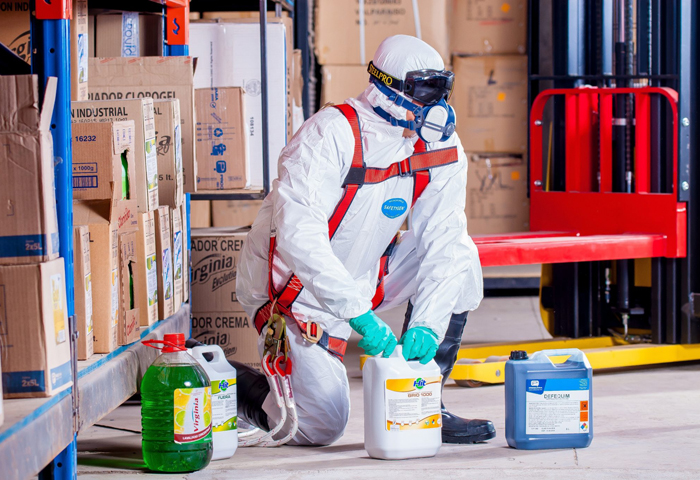Corrosive chemicals have a wide range of industrial uses, but they are highly reactive and can damage or destroy materials, like wood, metal or living tissue. It might be possible to use less hazardous substances instead of relying on corrosive chemicals in industries. However, where this cannot be done, you must take various precautions to make sure you use, handle, and store corrosive chemicals as safely as possible.
Examples of corrosive chemicals:
One of the most commonly used corrosive chemicals in industries is Sodium hydroxide. This chemical is often used in paper and soap manufacturing processes, as well as in the making of beauty products and cosmetics. It is great at breaking down fats, which is necessary during soap manufacturing but can be potentially dangerous if it’s swallowed, inhaled or gets into contact with your eyes or skin.
Hydrofluoric (HF) acid is another prominent corrosive chemical that is a very potent synthetic acid. It’s mainly used in processes like metal cleansing, as it has the ability to dissolve oxides and impurities from the surface of metals. HF is highly corrosive, enough so that exposure to tiny traces of the acid can cause serious injuries. To make it worse, these injuries may not be immediately observed or felt due to the accompanying nerve damage that is caused. HF acid is stored in specialized containers, as it breaks down nearly every material it comes into contact with.
Before choosing a corrosive chemical to use in your industry, you should always consider whether you can use a less hazardous substance as a substitute. If it is possible, then you should go for it.
Storage of Corrosive Chemicals
Generally, you should store corrosive chemicals in separate storage locations, far away from another handling, processing or material storage locations. These storage locations should be designed to reduce the damage and destruction that may be caused by fire, spillages, or leaks.
If it is not possible to store the corrosive substances in different locations, you must store them next to compatible substances. Do NOT store incompatible chemicals together, as they can cause violent reactions that emit toxic gases and heat.
Temperature
It’s important to store all chemicals at an appropriate temperature, although this temperature may not be the same for all corrosive substances. In general, you should store corrosive substances away from direct sunlight and heat sources and should keep them in well-ventilated and cool rooms.
Chemical Vessels
All corrosive substances should be stored in containers with proper seals and always remain sealed when not in use to minimize the risk of vapours escaping or liquids spilling. When decanting chemicals, it’s important to use an appropriate receptacle (usually one that will not react to the corrosive substance) and label the new container properly to notify users of the contents and potential hazards. You can use stainless steel drum pump for storing chemical vessels.
Handling Corrosive Chemicals
Corrosive substances are harmful; they can destroy and burn human tissue. With that in mind, it’s vital that you handle chemicals and containers carefully and diligently.
Moving the containers carrying the corrosive substances by hand can be dangerous and difficult. Therefore, you should always make use of safety bottle carries, carboy caddies or drum cradles to move chemicals safely.
Personal Protective Equipment (PPE)
Prior to handling any corrosive materials, it’s important to wear appropriate PPE. The different types of PPE you may need to wear include:
- The protective suit, apron, coveralls, impervious lab coat, etc.
- Boots
- Goggles
- Gloves
Disposal of Corrosive Chemicals
Corrosive materials are hazardous, so you must always handle them, mixed or pure, and empty containers carefully and safely. Never store waste chemicals in empty containers. Even if they may look clean, they may still have traces of other chemicals that may cause an adverse reaction.
Furthermore, you should never pour corrosive substances down a drain or sink. Instead, follow the manufacturer’s specifications regarding disposal, or use a hazardous waste collection and disposal company.











Comments